Blog / Diana Mastracci / August 8, 2019
The International Day of the World’s Indigenous Peoples is 9 August, and I join the world in honouring and acknowledging the resilience, dignity and strength of indigenous peoples around the world.
We are marking this day by announcing the launch of the GEO Week 2019 Hackathon, (G)EOHack19, an innovative hackathon to advance the use of Earth observation (EO) data by and for youth in indigenous communities. (G)EOHack19 will take place from November 2-4 in Canberra, Australia.
Hackathons are sprint type of competitions, usually 24-48 hours long, where anyone, from developers, programmers, artists to computer amateurs can get together to create solutions for a given challenge. They are inspiring events that encourage creativity and push participants to work collaboratively and think outside the box.
So why are we turning to the power of the crowd to promote the use of open EO data among indigenous communities?
If we want to ensure that we “leave no one behind” and make EO data more accessible to wider non-scientific audiences, including young people in indigenous communities, we need inclusive and innovative participatory methods that put the users at the heart of the research process.
Bridging indigenous and scientific knowledge to address community challenges
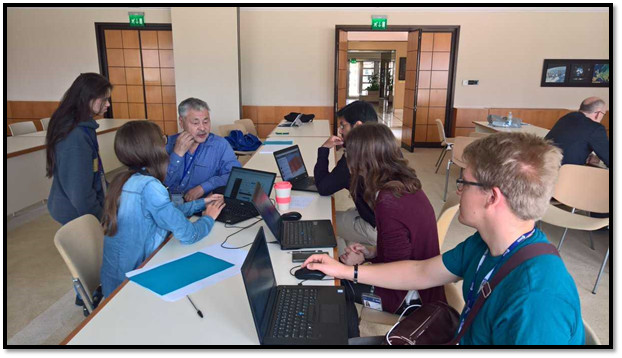

For the past four years I have been researching and developing creative hackathons to maximize the impact of current technologies and EO data to empower social change initiatives among indigenous communities around the globe.
Last year, we organized “GEOSS/Hack,” GEO’s first hackathon organized with the European Space Agency and based on real community needs for the UN Sustainable Development Goals (SDGs).
One of the six challenges of GEOSS/HACK, “Connecting Arctic Voices”, was co-designed by Inupiat whaling captain and sea-ice expert Gordon Ikayuak Brower. The challenge prompted hackers to think of creative ways in which satellite images could be used as a means to increase Elder-youth interactions and promote cultural awareness among the Inupiaq youth.
The challenge was presented at the hackathon by Arnold Jr. Brower, Inupiat whaling captain and Executive Director of the Alaskan Whaling Commission, who also took part in a knowledge co-production session with the hackers together with his wife JoJo and teenage daughter Emily. The workshop fostered a unique interdisciplinary, intercultural and intergenerational collaboration between the hackers and Inupiaq family. The exchange inspired a group of six hackers, from five different countries, to get together and design SEEKU, a concept mobile app that harnesses the power of EO and crowdsourced data to ensure safety in Arctic coastal communities.
Community developed solutions using Earth observation data
Over 240 hackers from all over the world have taken part in the EO hackathon challenges, creating over 60 innovative solutions for Arctic youth.
Together with the Arctic youth, Elders and NASA scientists, I have co-designed various innovative hackathons and citizen science projects at the interface of traditional and scientific knowledge.
Previous Hackathons included the “Sea-Ice App” and “The Arctic Game” for the NASA Space Apps Competition, the “Arctic Citizen Science” held in Utqiagvik, Alaska.
Here are some examples:
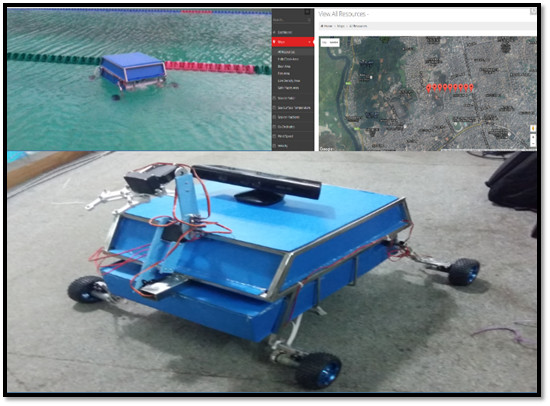

The Ice Rover Resilient, developed by three hackers in Bangladesh, is a rover that can traverse on icy terrain, float on water, has GPS and data storage capability, live video streaming of the mission, an autonomous scientist/human follower feature, wearable extension to control it manually as well as a semi-autonomous control with multiple UX and gesture controls.
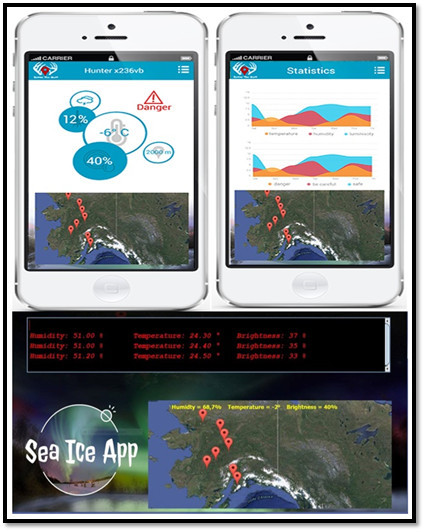

ICE-DIG, developed by eight hackers in Algeria, is a cross-platform intuitive and user-friendly application that gives subsistence hunters an accurate view of the area they wish to hunt. Additional features include: geo-location of the user, voice controller, ability to take images or record audio and full community support so that hunters can create notifications on hazards.
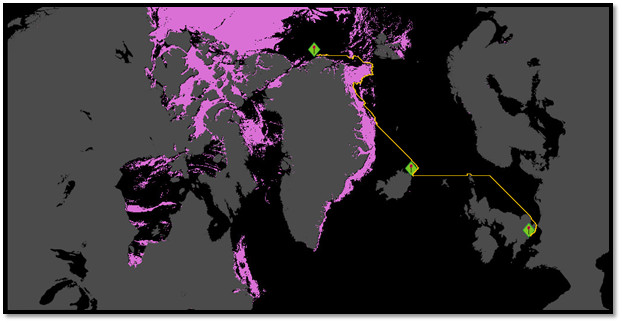

ICETrack, developed by two hackers in England, is a solution for navigating around ice and other hazards in the rapidly changing Arctic region. It combines satellite data with path planning algorithms to find safe routes for ships travelling through.
Want to know more about (G)EOHack19?
This year’s (G)EOHack19 builds on the lessons learned from these events and recommendations given by the local communities and hackers. The aim is to encourage the co-development of innovative EO-based applications that are locally relevant and enhance the community’s way of learning.
To ensure that the challenges of (G)EOHack19 address the needs and priorities of indigenous communities, they will be co-designed by the indigenous youth themselves together with their cultural leaders and Elders.
So save the date! We look forward to seeing you at the (G)EOHack19 in Canberra, Australia during GEO Week, November 2-4!
About the author
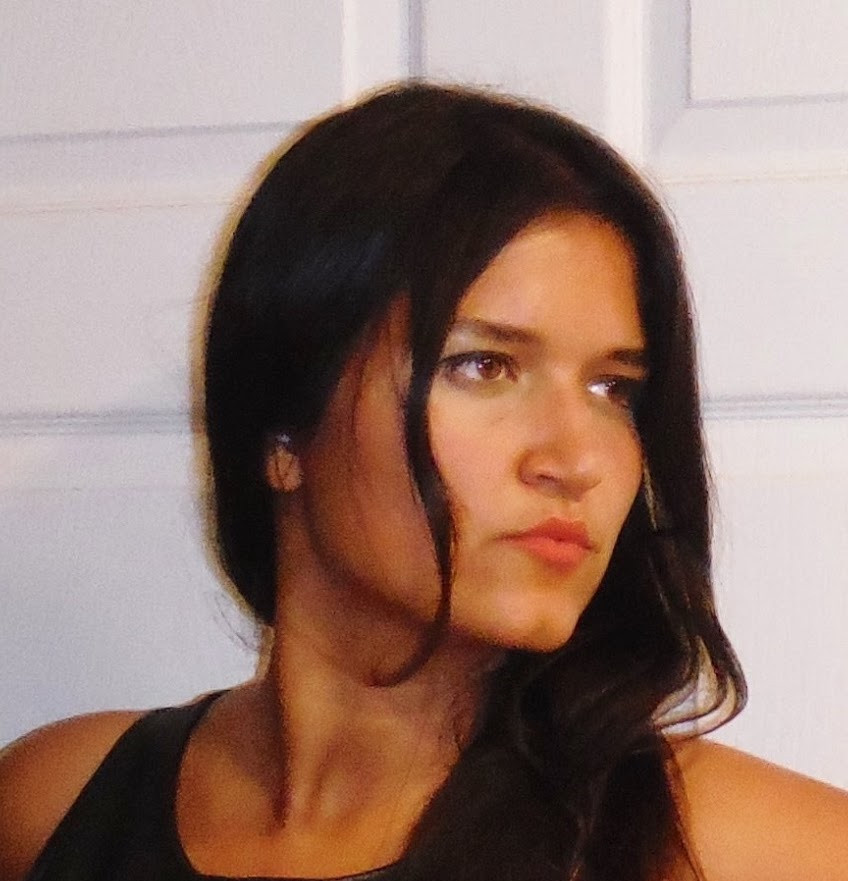
Diana Mastracci is a researcher at the University of Oxford passionate about finding creative ways to maximize the impact of current technologies to empower social change initiatives among indigenous communities. She has co-designed, together with the Arctic youth, Elders and scientists’ various innovative hackathons and citizen science projects at the interface of traditional and scientific knowledge. She has conducted fieldwork amongst the Iñupiat community in the Alaskan Arctic as well as with the Nenets reindeer herders in the Russian Arctic.
She has worked at the European Space Agency, NASA’s Jet Propulsion Laboratory, the University of Oxford, Citizen Cyberlab, was a visiting scholar at the Cartographic Research Centre at Carleton University and a visiting student at St. Petersburg State University. Diana holds an MA with joint Honours in Social Anthropology and Russian from the University of St Andrews, an MSc in Biodiversity, Conservation and Management from the University of Oxford and a Diploma in Documentary Filmmaking from the EICTV in Cuba.
Thank you for your subscription to the GEO Week 2019 mailing list.